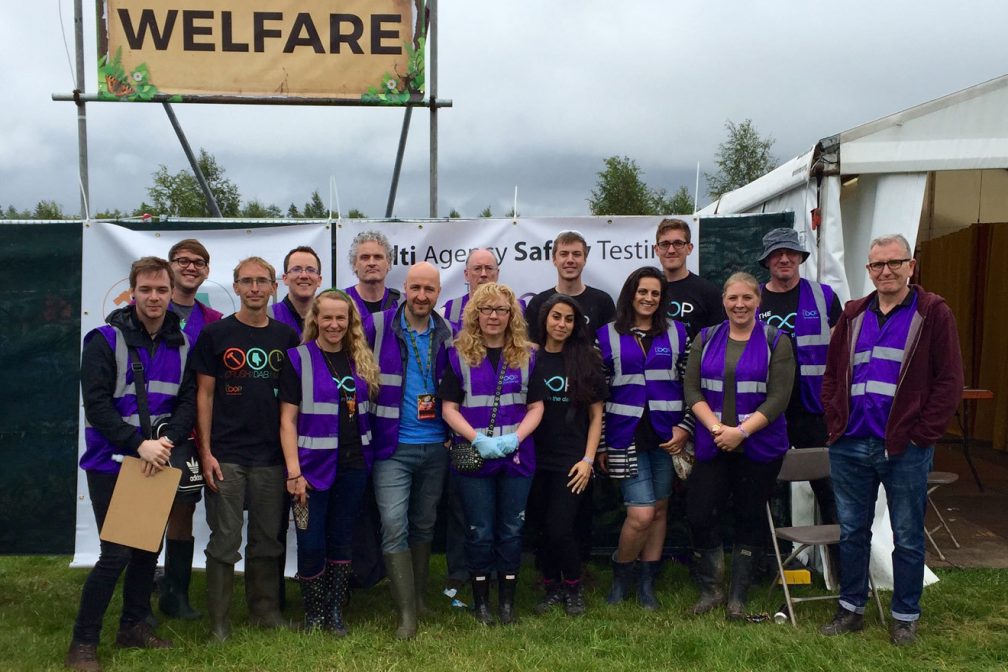 Features
Features
Meet the woman who wants to revolutionise the UK's approach to club drugs
Fiona Measham's charity The Loop is spearheading drugs safety
Fiona Measham is the Durham University professor at the heart of pushing UK drug policy into the 21st century. She’s the co-director of charity The Loop, an organisation which approaches drugs with a pragmatic outlook focusing on harm reduction and education. The charity's work and research promotes the safety of drug users, especially as the UK government continues to ignore the fact that recreational drug use is a very real part of our society.
As campaigns such as #CrushDabWait highlight, The Loop’s work exists to inform, not scaremonger, and the positive impact is already showing: it's become a trusted resource within the clubbing community and has potentially saved lives already. Through the testing Fiona does onsite at music events, The Loop is able to gather accurate and up-to-date information on substances and deliver tailor-made warnings when dangerous drugs are in circulation.
We caught up with Fiona in the days after the fabric ruling to discuss the steps that need to be taken to prevent drug deaths, protect night clubs and ensure going out is as safe as possible for UK residents.
Will drugs testing at clubs and festivals save lives?
The short answer is yes. The long answer is that I think it's a bit more complicated. I was interested in doing the pilot this summer to find out the answer to that question myself. There's not a lot of evidence showing how it changes peoples' behaviour; we all know the risks from alcohol but plenty of people drink more than the recommended sensible consumption level.
We were really pleased with how the pilots went for a number of reasons. Firstly and most importantly, when we told people what was in their drugs, a quarter of them said they didn't want them and asked us to dispose of them. We did it at Secret Garden Party and Kendall Calling and interestingly it was similar at both festivals. They're very different festivals with different demographics, music policies and average ages. That in itself is heartening because obviously the British have a reputation for being caners around the world, but a quarter of people, once told what was in the drugs, don't want them. That shows a level of responsibility and productive engagement with harm reduction.
"The police are pleased because we're pulling the rug out from under the feet of dealers"
Tweet this quote
Testing behind the scenes also means we can address and identify any dealers who are misselling drugs onsite that could be potentially harmful. At Secret Garden Party there were people selling anti-malaria tablets as cocaine, and at Kendall Calling people were selling boric acid as cocaine. We were able to put out warnings to people on social media and explain dealers were misselling substances. Really that's win-win for everyone. The police are pleased because we're pulling the rug out from under the feet of dealers; paramedics onsite and NHS staff in hospitals are pleased because there's going to be less medical incidents and less pressure on NHS beds; and obviously drugs users themselves as well because they're not buying crap off dealers that they don't want. Testing like that is good news for everyone.
To give you another example from testing at the Warehouse Project, when the red Superman pills were circulated I said to them "can you put out a warning that they contain PMMA?". We were the first people to do that warning in the UK. Subsequently four people died in the South East/East Anglia/Midlands. Public Health England didn't put out a warning until after the deaths. As soon as people know what red Superman tablets contained no one will buy them because people don't want PMMA. The Netherlands put out the warning quick enough and nobody died there. In the UK the warning was put out late and four people died.
"We know that this isn't just a club problem. It's a drug problem"
Tweet this quote
So, do I think testing will save lives? I think it can, and there's evidence that those sorts of warnings and information onsite and on social media can save lives, and it has in the Netherlands. In Zurich they do testing events and since they started that they've not had any deaths at all, I think that's in six years.
But there is a but, and I think that it's clubs aren't necessarily the best place to do testing. What I would like to see is pop-up testing in city centres in little pop-up Loop testing kiosks. It would be close enough to the clubs and early enough on in the evening so that people could get testing done before going into clubs. That would be more beneficial I think than when you go to a club, especially somewhere that's open late where people don't get there until after midnight. They'll have been to other places beforehand, maybe drinking, maybe taking drugs. It's less likely that they'll be able to productively engage with the testing and harm reduction information than if it's earlier in the night. And we know that people take drugs at live concert areas. A 17 year old girl died from MDMA crystal at the O2 arena in London just a few months ago, so we know that this isn't just a club problem. It's a drug problem. I think it would be good to have pop-up kiosks that all people can go to. That's my new plan and I'm waiting for a rich benefactor to fund it! The Loop is run by donations and volunteers. We need a national service that's available across the UK.


